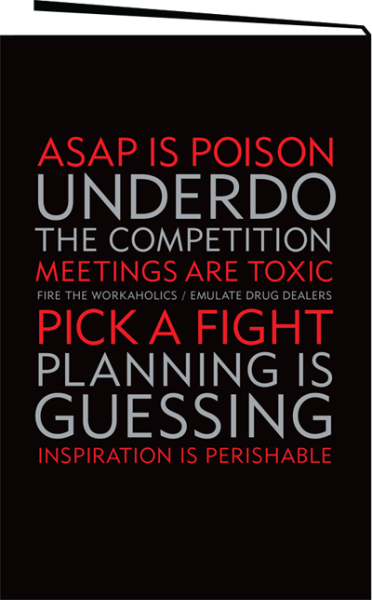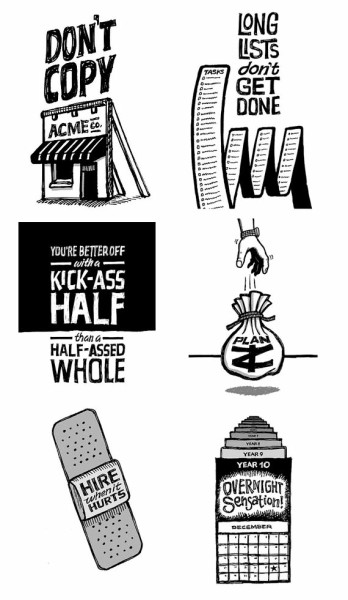 I finished reading Rework by Jason Fried and David Heinemeier Hansson a few days ago. It’s a great book – easily the best business book that I’ve read. Here are a few quotes from the book that I saved:
I finished reading Rework by Jason Fried and David Heinemeier Hansson a few days ago. It’s a great book – easily the best business book that I’ve read. Here are a few quotes from the book that I saved:
On Building Things
When good enough gets the job done, go for it. It’s way better than wasting resources or, even worse, doing nothing because you can’t afford the complex solution. And remember, you can usually turn good enough into great later.
The way you build momentum is by getting something done and then moving on to the next thing.
The real world isn’t a place, it’s an excuse. It’s a justification for not trying. It has nothing to do with you.
The perfect time never arrives. You’re always too young or old or busy or broke or something else. If you constantly fret about timing things perfectly, they’ll never happen.
Just because you’ve still got a list of things to do doesn’t mean it’s not done. Don’t hold everything else up because of a few leftovers. You can do them later. And doing them later may mean doing them better, too.
Is there an easier way? Whenever you’re working on something, ask, “Is there an easier way?
On timelines
The longer something takes, the less likely it is that you’re going to finish it.
Ask yourself, “What can we do in two weeks?” And then do it. Get it out there and let people use it, taste it, play it, or whatever. The quicker it’s in the hands of customers, the better off you’ll be.
Keep breaking your time frames down into smaller chunks. Instead of one twelve-week project, structure it as twelve one-week projects.
If you want to do something, you’ve got to do it now. You can’t put it on a shelf and wait two months to get around to it. You can’t just say you’ll do it later. Later, you won’t be pumped up about it anymore.
Give up on the guesswork. Decide what you’re going to do this week, not this year. Figure out the next most important thing and do that. Make decisions right before you do something, not far in advance.
There’s always enough time if you spend it right. And don’t think you have to quit your day job, either. Hang onto it and start work on your project at night.
On Products
Build half a product, not a half-assed product.
Pour yourself into your product and everything around your product too: how you sell it, how you support it, how you explain it, and how you deliver it. Competitors can never copy the you in your product.
Don’t shy away from the fact that your product or service does less. Highlight it. Be proud of it. Sell it as aggressively as competitors sell their extensive feature lists.
Emulate drug dealers. Make your product so good, so addictive, so “can’t miss” that giving customers a small, free taste makes them come back with cash in hand.
 When you start anything new, there are forces pulling you in a variety of directions. There’s the stuff you could do, the stuff you want to do, and the stuff you have to do. The stuff you have to do is where you should begin. Start at the epicenter. The way to find the epicenter is to ask yourself this question: “If I took this away, would what I’m selling still exist?”
When you start anything new, there are forces pulling you in a variety of directions. There’s the stuff you could do, the stuff you want to do, and the stuff you have to do. The stuff you have to do is where you should begin. Start at the epicenter. The way to find the epicenter is to ask yourself this question: “If I took this away, would what I’m selling still exist?”
What problem are you solving? What’s the problem? Are customers confused? Are you confused? Is something not clear enough? Was something not possible before that should be possible now? Is this actually useful? Are you making something useful or just making something? It’s easy to confuse enthusiasm with usefulness.
On Customers:
When you stick with your current customers come hell or high water, you wind up cutting yourself off from new ones. Your product or service becomes so tailored to your current customers that it stops appealing to fresh blood. And that’s how your company starts to die.
People and situations change. You can’t be everything to everyone. Companies need to be true to a type of customer more than a specific individual customer with changing needs.
Earning their [your customers’] loyalty by teaching them forms a whole different connection. They’ll trust you more. They’ll respect you more. Even if they don’t use your product, they can still be your fans.
You want your customers to say, “This makes my life better.” You want to feel that if you stopped doing what you do, people would notice.
The core of your business should be built around things that won’t change. Things that people are going to want today and ten years from now. Those are the things you should invest in.
On Competitors
Instead of trying to outspend, outsell, or outsponsor competitors, try to out-teach them. Teaching probably isn’t something your competitors are even thinking about. Most businesses focus on selling or servicing, but teaching never even occurs to them.
On Pitching
What do you call a generic pitch sent out to hundreds of strangers hoping that one will bite? Spam.
On Learning
Another common misconception: You need to learn from your mistakes. What do you really learn from mistakes? You might learn what not to do again, but how valuable is that? You still don’t know what you should do next. Contrast that with learning from your successes. Success gives you real ammunition. When something succeeds, you know what worked–and you can do it again. And the next time, you’ll probably do it even better.
Rework is a great book and I highly recommend buying it. There’s a lot more inspiration between the covers. Go to the Rework website or the iTunes BookStore and pick up a copy.

